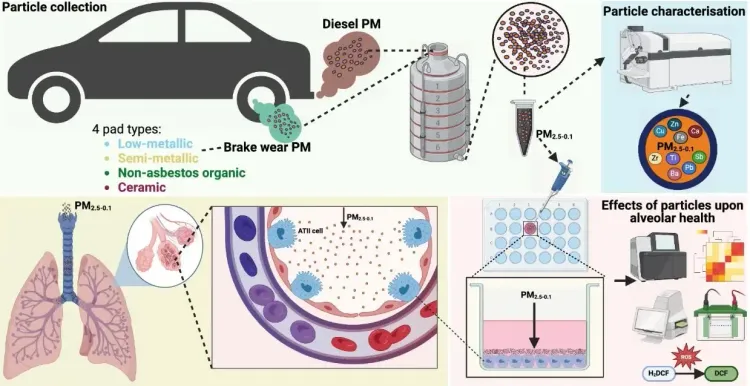Car Brake Wear Pollution More Detrimental to Lungs than Diesel Exhaust: Research

Synopsis
Key Takeaways
- Car brake wear pollution is more harmful to lungs than diesel exhaust.
- Current regulations inadequately address non-exhaust PM emissions.
- Airborne PM2.5 contributes to over 4 million deaths yearly.
- Copper-enriched brake wear PM induces significant health risks.
- Research emphasizes the need for broader emission regulations.
New Delhi, Feb 17 (NationPress) Exposure to pollution resulting from car brake wear can be more damaging to the lungs compared to diesel exhaust, as revealed by a recent study.
The research, spearheaded by scientists from the University of Southampton in the UK, highlighted that merely concentrating on particulate matter (PM) emissions from exhaust may fall short in addressing the health repercussions of pollution from vehicles.
Airborne PM2.5 can penetrate the alveolar areas of the lungs and is linked to over 4 million premature deaths annually across the globe. Although road traffic, specifically diesel exhaust emissions, is a primary contributor to PM in urban settings, non-exhaust emissions, particularly from brake wear, represent an increasingly significant aspect of traffic-related PM, yet little is known about it.
The researchers pointed out that car brake wear is not included in current exhaust emission reduction strategies.
In their publication in the journal Particle and Fibre Toxicology, the team discovered that brake-wear PM from copper-enriched non-asbestos organic and ceramic brake pads resulted in the highest levels of oxidative stress and inflammation in the lungs.
This type of pollution also disrupted pathways linked to diseases related to air pollution exposure, such as cancer and pulmonary fibrosis, along with affecting metabolic processes.
“We demonstrate that brake-wear PM may disrupt cellular homeostasis more than diesel exhaust PM. Our findings highlight the potential differences in effects, not just between non-exhaust and exhaust PM but also among various sources of non-exhaust PM,” stated James G. H. Parkin from the School of Clinical and Experimental Sciences at the University of Southampton.
The study concluded that copper-enriched brake-wear PM has a more harmful impact than PM from diesel exhaust. The disruptions caused by this copper-enriched PM could contribute to the onset and progression of numerous diseases, adversely affecting health and longevity.
“Our results imply that existing regulations focusing on PM from exhaust emissions may not be sufficient to alleviate the health impacts of vehicle-related PM, suggesting a need for regulations that also encompass non-exhaust PM emissions and their specific components,” Parkin further added.









